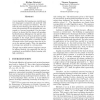Free Online Productivity Tools
i2Speak
i2Symbol
i2OCR
iTex2Img
iWeb2Print
iWeb2Shot
i2Type
iPdf2Split
iPdf2Merge
i2Bopomofo
i2Arabic
i2Style
i2Image
i2PDF
iLatex2Rtf
Sci2ools
143
click to vote
COLT
1998
Springer
1998
Springer
Learning One-Variable Pattern Languages in Linear Average Time
A new algorithm for learning one-variable pattern languages is proposed and analyzed with respect to its average-case behavior. We consider the total learning time that takes into account all operations till an algorithm has converged to a correct hypothesis. For the expectation it is shown that for almost all meaningful distributions defining how the pattern variable is replaced by a string to generate random examples of the target pattern language this algorithm converges within a constant number of rounds with a total learning time that is linear in the pattern length. Thus, the algorithm is average-case optimal in a strong sense. Though one-variable pattern languages cannot be inferred finitely, our approach can also be considered as probabilistic finite learning with high confidence.
COLT 1998 | Machine Learning | One-variable Pattern Languages | Pattern Languages | Total Learning Time |
Related Content
| Added | 05 Aug 2010 |
| Updated | 05 Aug 2010 |
| Type | Conference |
| Year | 1998 |
| Where | COLT |
| Authors | Rüdiger Reischuk, Thomas Zeugmann |
Comments (0)

